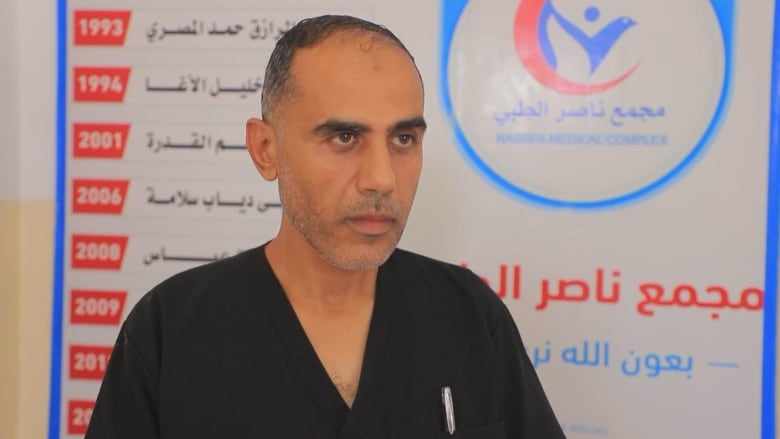
A truck carrying 88 unidentified bodies of Palestinians killed in Israel’s military offensive in Gaza arrived in Khan Younis on Wednesday, but the Palestinian Ministry of Health has paused the process of accepting the bodies because Israel has not provided any information on their identities or how they were killed.
According to the Health Ministry, the bodies were put into a container, loaded onto a truck and sent through an Israeli-controlled border crossing to Nasser Hospital in southern Gaza.
“The Palestinian Ministry of Health has suspended the procedures for receiving the container until all data and information about these bodies are completed to identify their owners and their names, considering that this is the minimum rights of these people and their families,” the ministry said in a statement Wednesday.
Health officials at the hospital refused to have the bodies examined and prepared for burial and urged the International Committee of the Red Cross (ICRC) to seek details from Israel.
Zaher Al-Wahadi, head of the Palestinian Health Information Centre, said no information was provided about the names or ages of the dead or locations of where they died.
“The bodies we received [were] without any co-ordination with us or any co-ordination with the ICRC,” Al-Wahadi told CBC News on Wednesday.

Al-Wahadi said in order for the Health Ministry to accept the container, Israel must provide information on each individual killed so that the next steps of identifying them and providing appropriate burials can take place.
He said roughly 6,200 bodies in Gaza remain unidentified due to either incomplete data provided on their identities, such as only a first or last name, or a lack of distinguishing marks on their bodies that could be used to identify them.
Wednesday marks the fifth time that health officials in Gaza have received unidentified bodies in a similar manner, Al-Wahadi said.
CBC News contacted the Israeli Defence Forces (IDF), but did not receive a response.
Families have right to obtain information: Red Cross
In a news release Wednesday, the ICRC said it wasn’t involved in the transfer.
“We reiterate the right of all families to obtain information about their loved ones and to bury them with dignity and in accordance with custom and tradition,” the ICRC said.
Under International Humanitarian Law, those who have died during an armed conflict must be handled with dignity and be properly managed. The law requires that they be searched for, collected and evacuated, which helps ensure that people do not go missing, the ICRC statement added.
The organization said it remains in contact with both Israeli and Palestinian officials to remind them of these rules.
The ICRC said its committee members provided “technical and material assistance” to responders and forensic specialists to support them in recovering bodies and handling them with dignity. It also provided them with body bags and personal protective equipment.
10,000 Palestinians reported missing
The head of the Gaza government media office said Health Ministry officials told the driver of the truck to bring the bodies of dead Palestinians back to the Israeli crossing from which he had arrived. The truck then left the hospital.
“They must act according to the international humanitarian law and in a way that preserves the dignity of the martyrs and their families,” Ismail Al-Thawabta told Reuters.
The Civil Emergency Service tasked with finding people missing under rubble, on roads and in ruined buildings in Gaza says it has been notified of around 10,000 people missing during the nearly year-long Israeli assault on Gaza.
Gaza health authorities list more than 41,000 Palestinians confirmed killed in the assault, which Israel launched after Hamas-led fighters attacked Israeli towns on Oct. 7 last year, killing 1,200 people and capturing around 250 hostages.
In recent days, the conflict has spread to another major theatre, with Israel launching the biggest airstrikes on Lebanon in nearly two decades, targeting Hezbollah, which has been rocketing Israel in solidarity with the Palestinians.
At least 14 killed in new Israeli strikes
War in Gaza has not let up, even as the conflict in Lebanon has escalated. Many months of diplomatic efforts to reach a Gaza ceasefire have yielded little progress, with Israel refusing any deal to halt the fighting without the total defeat of Hamas.
Israeli military strikes across the Gaza Strip killed at least 14 Palestinians on Wednesday, medics said.
In Rafah, near the border with Egypt, Israeli forces continued their operations in different areas of the city, amid clashes with Hamas-led fighters, according to residents and statements posted by militants.
Medics said at least eight Palestinians were killed in two separate Israeli strikes on two houses in Rafah. One of those strikes killed a woman and her children, they added.
In another attack in Bureij, one of the Gaza Strip’s eight historic refugee camps, five Palestinians were killed in a house hit by an Israeli missile, medics said.
Israel has also sent tanks into the eastern area of Beit Lahiya in the northern Gaza Strip, and medics said a woman was killed in an airstrike on a house in the town earlier on Tuesday.